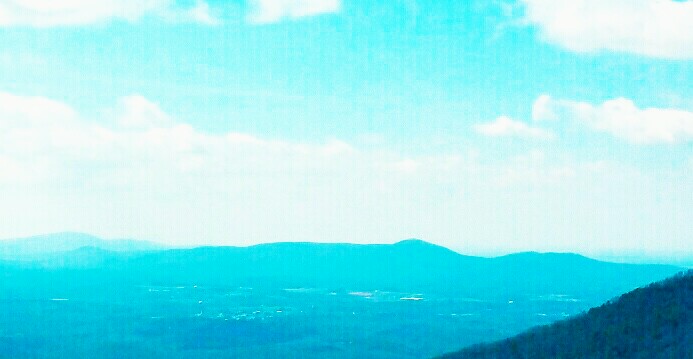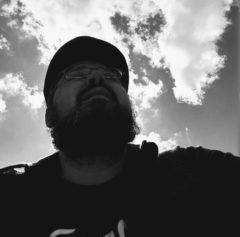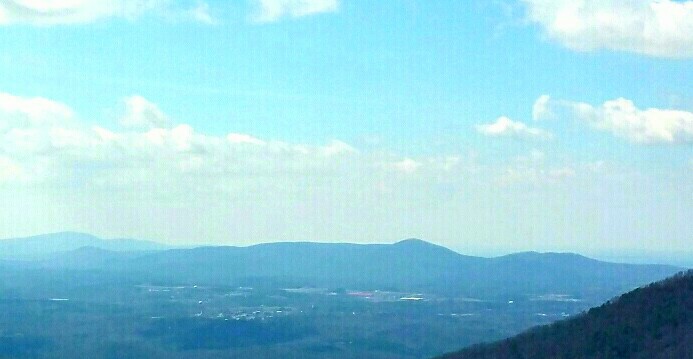
The first time Holly tried to kill herself, when she was seventeen, her mom and Bill picked her up from the hospital in Atlanta and took her to the mountain house. Her mother thought it would be good to get away. She stared at the orange lights on the dash of her mother’s Mercedes as they rode up the mountain in the dark. Bill drove, and every so often, her mother would turn around to make sure she was still there.
Holly said: It’s not like I’m going to jump out of the car.
What? Bill said. What?
She didn’t repeat it.
The next morning she woke up a little before noon. The bedroom she slept in was downstairs. She went up to the main floor of the house which had floor-to-ceiling windows that looked out over a great cliff. The mountains across the valley made the shape of a great, big sleeping woman. There was one a bit taller and pointed. That made the breast. The mountains north of that—she couldn’t remember the names of any of them—those to the north formed her head, so that it looked like it was turned away west. Then there were some small mountains and hills to the south which formed her hips and feet.
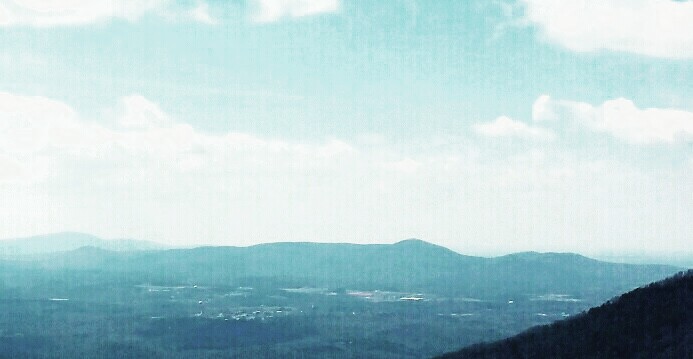
She walked into the kitchen, helped herself to a cup of coffee from the pot. Her mother cracked an egg unevenly, dropped it in a glass bowl, and then fished out pieces of shell.
Good morning, her mother said.
What are you doing?
Breakfast. Her mother forced a smile.
She rolled her eyes, walked from the open kitchen over to the big chair in the living area. Bill was sitting in one of the two smaller chairs across the big heavy wooden coffee table from her, reading the paper. There was a large, corduroy sofa between them where no one sat.
Dressed in boys’ boxers and a tank top, she sat with one of her legs on the arm of the chair, the other on the floor, knowing it spread the fly of the shorts. She sat like that for a while, but Bill never looked up from the paper.
Then breakfast was ready. They sat at the dining room table between the kitchen and the living area, without saying a word. The eggs were poorly scrambled and under-cooked, the bacon was burned. While they were eating, she kept fiddling with the bandages across her wrists, though she could tell it made her mother uncomfortable.
They itch, she said, her mouth full. No one had said anything.
Her mother sighed, Bill did not look up from his eggs. After a while, the silence became too much. She said to them: You know, burned bacon is cancerous. It has carcinogens.
Bill’s fork splashed against his plate. He finally looked up at her. She looked at her mother, saw that her mother was about to cry.
I like burned bacon, she said. I like carcinogens—all the best stuff in life kills you eventually anyway, right?
She tried to finish her plate, but left a few bites. She went downstairs and sat on the stone steps just outside the back door and chain-smoked most of the day. As the sun started to set, she went inside and back up to the living room. Bill and her mother were in the master bedroom with the door closed. She went to the liquor cabinet, pulled out the handle of gin, and made a gin and tonic. She knew it would piss them off, but she needed a drink if she were going to make it through dinner.
She made it stiff. She took a sip and stared out the window remembering her father explaining the view of the sleeping woman to her, shortly after he and her mother had finished the house. This was the house they had built together to get away—to start over. But in the end, the expense and the problems with the builder had made it worse. Really, it was that her mother was spending fifty hours a week or more at the company where she was Chief Financial Officer. Her mother was obsessed with money, and her father had always been horrible with it. After the divorce, he moved back to Colorado to be near his brothers. He had always missed Colorado. It was the place where he grew up, the place he loved. She wanted to go there, to see him, but she couldn’t because he was drinking himself to death. That was what her mother told her.
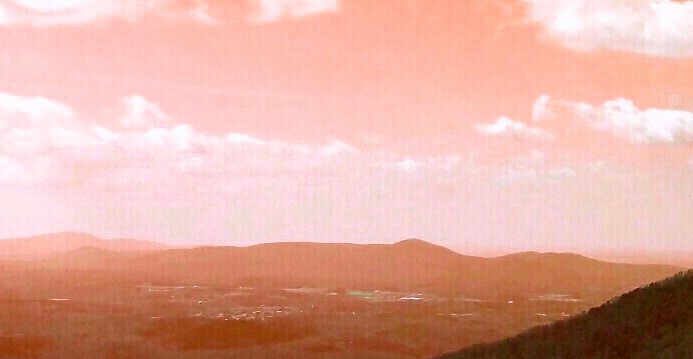
The sun had now fallen behind the horizon to the far side of the sleeping woman. It looked like someone had opened a wrist and it was now bleeding, blue and red and purple into the sky like bath water. To the east of the woman’s waist and thigh, in the valley between the mountains, there was a lake. She could see the headlights of the cars crossing the dam, no bigger than the head of a pin. Further south and west, the town below poked out of the trees here and there.
The gin and tonic was almost gone, but she wanted to stand there all night, watching the distant cars pass over the dam. After the sun was down, she would only be able to watch their headlights moving slowly across the dark expanse. And behind it, the lights of the town would twinkle, and the stars, which were so clear up there, would look like its mirror image on the sky.
She liked the look of things at such a great distance. Like one of those model train sets people build with the tracks through the town and the mountains, and all the tiny people and cars glued in place—which is how she thought we must look to G*d.
That was why she did it.
Holly knew Bill and her mother would have to come out of their room soon, and they would probably want to talk. And they would want to know why. And she would want to tell them—show them—the cars and the lights of the town. She would want to tell them that it was what G*d must see, that all she really wanted was to feel like G*d—distant and detached. She would want to tell them that, but she knew they wouldn’t get it.
